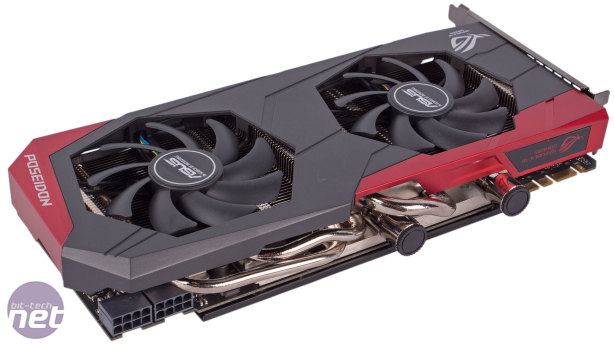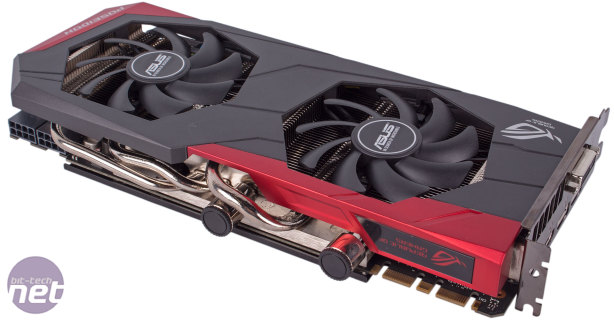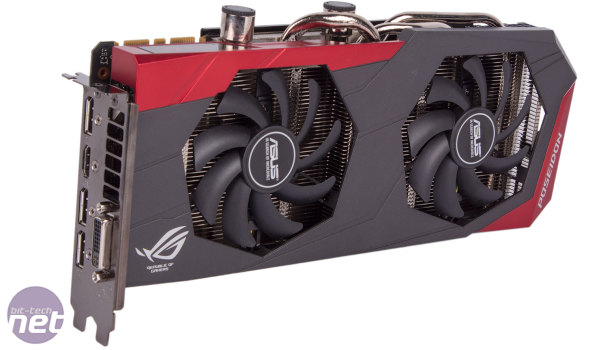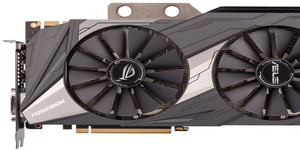
Performance Analysis
Unsurprisingly, the GTX 980 Ti Poseidon is top of the charts in every game test. Going by average frame rates, we see that it's 6 percent quicker than a reference GTX 980 Ti both at 1440p and at 4K. Compared to AMD's finest, the R9 Fury X, it has a 15 percent lead overall at 1440p, and this drop to 10 percent on average at 4K.The minimum frame rates tell us that this card is extremely well cut out for ultra high detail 1440p gaming, as it gets at least 60fps in every game except Crysis 3, where it's very close with 58fps. 4K gameplay is also impressively smooth, with the card sitting comfortably within the 30-60fps zone in each test, again excluding Crysis 3 where it just misses out with 29fps. Paired with a 4K G-Sync screen, the experience is sure to be memorable, but if you want to be closer to or above the 60fps mark at this resolution, you're going to need a second card.
Power consumption actually came out a little lower than a stock GTX 980 Ti despite the additional clock speeds, so there definitely appears to be truth in Asus's claims regarding the efficiency of its Super Alloy Power II components.
Cooled by air, the GTX 980 Ti achieves a very respectable delta T of 51°C. Of the GTX 980 Ti cards we've seen, only Gigabyte's G1 Gaming variant has managed lower. However, those with higher temperatures, including Asus's own Strix card, have lower noise output. The fans on the Poseidon reached about 2,000 RPM under sustained load and the card was definitely audible, but it's still a clear reduction in noise compared to reference, and the low temperature means there's leeway for you to limit the fan speed manually.
Running liquid through the DirectCU H2O cooler is another game entirely though. Here, the core temperature is less than half of what it is on a reference card, giving us a delta T of just 23°C, a 28°C improvement over air alone. Here, the card's fans were silent at about 1,000 RPM, though remember our pump and fans were set to full speed in a best case scenario loop where the GPU was the only component cooled. Still, you could definitely slow things down to be much quieter and still have very healthy temperatures – the DirectCU H2O is clearly effective whether it's using air or water.
While the card was already fast, we saw improvement of between 14 and 18 percent from overclocking, where the card was running under load at 1,455MHz. This did push the power up to 450W or so, and the fans also got a bit louder – we probably wouldn't overclock it this far on air alone.
Water-cooling the card while leaving the frequencies unchanged does result in a modicum of extra performance – our score in Unigine was about 1.5 percent better as a result of improved boosting and a higher average frequency. With the power, temperature and voltage limits also maxed out, this difference rose to 3 percent. In reality, you're not going to notice any difference in games by water-cooling, as it takes something with a granular scoring system to show any difference. However, as mentioned, we were able to achieve a slightly higher overclock, whereby the frequency was hovering at almost 1,500MHz – absolutely massive for a GTX 980 Ti. This saw an extra 2 or 3fps gained in games compared to our air-cooled overclock. This isn't game changing but it's still a strong result.
Conclusion
Given its price and the almost unique selling point that it offers, the GTX 980 Ti Poseidon is for a very niche demographic. It's about £15 more expensive than its only real competing product, the Zotac GTX 980 Ti ArcticStorm, which really isn't much at this price level.Of course, £645 is a massive amount of money for most people when it comes to graphics cards, but relative to other custom water-cooled GTX 980 Ti solutions, it's not really bad value. One option is to simply buy a reference card and waterblock yourself – you can do this for about £610, but you're looking at £635 if you include a backplate like the Poseidon card has. However, this doesn't get you the upgraded PCB offered here, and you also have the fuss (or fun, depending on your outlook) of piecing it together yourself, which will of course void your warranty. You can also buy cards pre-assembled for water-cooling from Overclockers UK (two year warranty) or EVGA (three year), but these are £30-£40 more expensive.
In the end, this is never going to be a card for a lot of people, but if you're looking to liquid cool a GTX 980 Ti card with minimal fuss and while also keeping your warranty in-tact, this is a great option, especially if you want higher frame rates now but don't have the cash to also buy a full set of water-cooling gear just yet.

-
Performance39 / 40
-
Features28 / 30
-
Value18 / 30


MSI MPG Velox 100R Chassis Review
October 14 2021 | 15:04











Want to comment? Please log in.